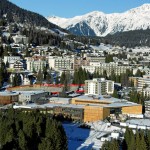 At the back end of last year I attended a talk at LSE by Noreena Hertz, who was there to promote her latest book Eyes Wide Open in which she describes how often the experts we tend to place so much faith in are wrong.
At the back end of last year I attended a talk at LSE by Noreena Hertz, who was there to promote her latest book Eyes Wide Open in which she describes how often the experts we tend to place so much faith in are wrong.
Of course, it’s not something that’s particularly new, and has been in the mainstream consciousness since Wisdom of Crowds was published over a decade ago.
It continues to crop up in various places however, such as this Harvard study comparing editors at Encyclopaedia Britannica and Wikipedia. It found that the more frequently Wikipedia is edited, the more balanced the articles become, which is obviously not generally an option open to Britannica.
The surreal world of Davos
Of course, the cult of the expert has hardly been dimmed by this rising appreciation for the merits of ‘the crowd’. The epitome of this is the recent gathering of the ‘great and the good’ at the Swiss resort of Davos for the World Economic Forum.
The gathering was the focus of a recent paper that set out to explore just what it was that emerged from the event.
“The World Economic Forum claims that it is solving some of the most vexing issues of our time such as poverty or youth unemployment. But what are the solutions and how do they affect our lives?” the authors write.
The authors delved into the Davos world, talking to delegates over an eight year period about what it was they did, what they hoped to achieve from the event, what their beliefs were, even what they understood about themselves.
An enlightened elite
In true Plato’esq style, the delegates at Davos typically regarded themselves as an enlightened elite who were driven by ethical considerations. They were coming together to preserve the common good from populist temptations.
The interviews revealed a four step process of moral reform:
- The issue at hand was typically shifted to one of individual consumption (ie inequality tends to result in poor choices made at an individual level rather than market failure)
- Better individual choices could be made through greater involvement of the market in their decision making
- Governments should support this market based solution
- Inequality is not a matter of rich vs poor, but rather one of how responsibly the poor behave as consumers
“Previous portraits of Davos delegates as uprooted jetsetters or global networkers easily overlook their influence on society. Our findings reveal that the forum actively shifts the burden for the solution of problems from governments and corporations to individual consumers, with significant personal and societal costs,” the authors conclude.
Ethics aside though, given the growing mountain of evidence suggesting that experts often aren’t any better at predicting things than the rest of us, is it right that this shindig should retain such influence?
I wouldn't trust the Davos crowd as far as I could throw them to be honest. Bunch of self important twunts.